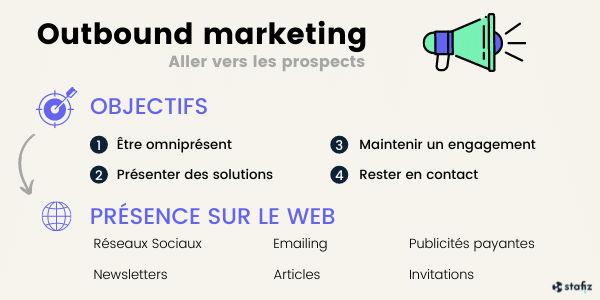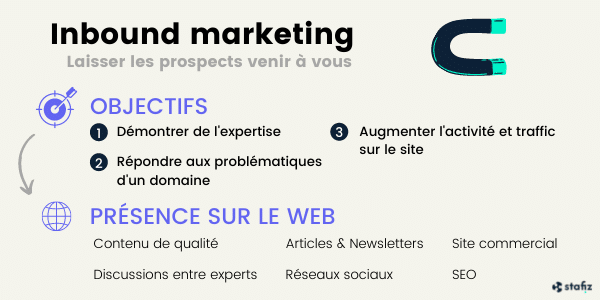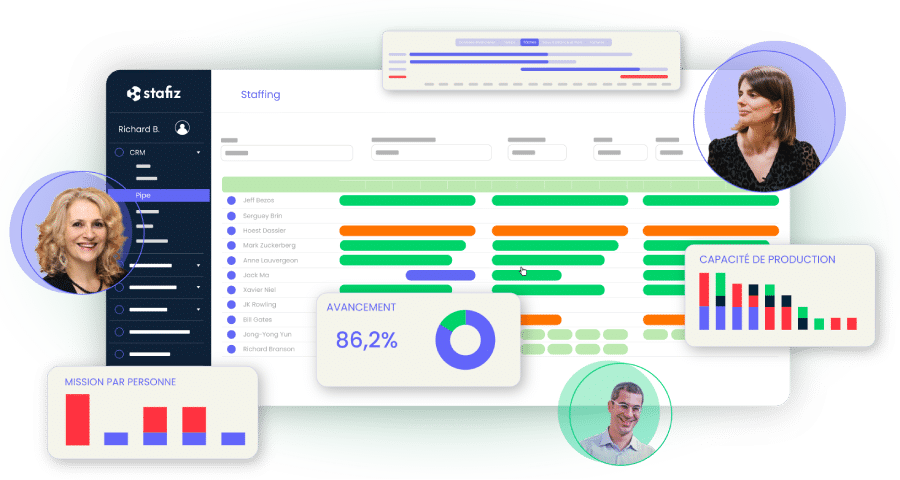Comment développer sa société de conseil ?
Gestion de l'activité
- Se faire connaitre : marketing Outbound et Inbound
- Exposer et développer son expertise
- Se concentrer sur l’expérience client
Au cœur d’une économie complexifiée et en perpétuelle évolution, les sociétés de conseil se caractérisent par leurs profils très différents en résonance avec un marché très concurrentiel. En effet, chaque année, les activités du secteur croient de façon significative, culminant à 12% en 2018 après 6 ans d’augmentation consécutive. Même après un recul de l’activité en 2020 (-11,4%), le marché du conseil continue d’évoluer grâce à de nouvelles tendances. Ce qui permet à l’activité de, petit à petit, continuer de monter en croissance.
Les Big Four (Deloitte, PwC, Ey et KPMG) réunissent à eux seuls 37,4% du marché mondial. Les 10 premiers cabinets de conseil sont en possession de jusqu’à 56,6% du marché total. C’est pourquoi les plus petites structures restantes doivent faire preuve de réactivité et d’intelligence afin de se faire une place et de rester compétitif. La croissance d’une société de conseil dépend de stratégies commerciales et marketing dont l’adoption est cruciale.
Un cabinet de conseil, après avoir identifié sa cible de marché, sa niche et un profil de client parfait, doit prendre les devants afin de booster sa croissance.
1. Se faire connaitre : Marketing Outbound et Inbound
Peter Drucker, le « pape du management », professeur en management et consultant austro-américain, considère que « L’objectif du marketing est de rendre la vente superflue. ». Ainsi, bien marqueté, un produit ou un service se vend par lui-même : il est devenu essentiel aux yeux du client.
Si une société de conseil a conscience de son audience visée, elle va pouvoir affiner sa communication pour s’adapter à ses besoins et présenter un message véritablement sur-mesure à ses clients.
Le Marketing Outbound : se manifester vers les prospects

Comment réunir le public approprié ?
Avec des associations et fédérations professionnelles, ou autres événements comme des séminaires, des salons, des workshops ou encore des tables rondes. Ce sont de multiples opportunités de rencontres et d’échanges.
Mais se faire connaitre et s’exposer à des cercles de potentiels clients passent dans un premier temps par une présence régulière et pertinente sur le web et les réseaux sociaux (Facebook, Twitter, LinkedIn…). Agissant de façon proactive, le cabinet de conseil est ainsi omniprésent lorsque son audience recherche une solution à un de ses problèmes et se retrouve exposée à un large panel de choix et d’options.
En effet, Internet, au contraire du réseautage en face-à-face, a démultiplié les alternatives tout en offrant plus de comparaisons plus optimisées. Cela rendant ainsi la compétition plus rude et davantage basée sur les services de la société que sur ses employés.
Une fois le contact effectué, le tout est de rester dans la tête du client. Cela passe, en plus d’une activité constante sur Internet, par un emailing ajusté (newsletters, invitation, publication d’articles…). Il ne faut pas briser l’échange une fois qu’il est lancé. Ainsi, le site web du cabinet doit exposer directement un moyen de maintenir ce contact : s’inscrire à la newsletter ou encore aux réseaux sociaux. Il est ainsi plus simple de créer un engagement avec le prospect.
La publicité payante sur le net ou offline est aussi une stratégie marketing envisageable afin de développer sa société de conseil.
Le Marketing Inbound : faire en sorte que les prospects se manifestent naturellement

Créez du contenu de qualité. Cela démontre l’expertise de la société dans une niche spécifique et répond aux problématiques et évolutions que connait son domaine. C’est aussi un moyen d’illustrer avec acuité les capacités d’un cabinet de conseil. Bien plus que de la vulgarisation, ces articles correspondent à une discussion entre experts.
Ce contenu prend majoritairement la forme d’articles de blog publiés dans la partie blog/articles du site commercial du cabinet et hébergés sur une plateforme telle que WordPress, Blogger, Tumblr, Squarespace ou Posterous. Ces articles illustrent une actualisation et une remise en question permanente de l’expertise de la société de conseil en plus d’augmenter l’activité, et donc le trafic, sur le site Internet.
Avec un SEO adapté, ce contenu devient une réelle stratégie commerciale indirecte. En effet, les clients cliquent sur l’article, attirés par son propos et atterrissent sur le site Internet du cabinet de conseil. Ils s’exposent aussi bien à la pertinence et à l’expertise d’une société ayant des réponses appropriées à ses questions qu’à une façon de poursuivre le dialogue via le blog, la newsletter ou même les réseaux sociaux. La visibilité du site croit, augmentant par conséquent les prospects potentiels.

2. Exposer et développer son expertise
En 2021, la communication digitale fait fureur et il peut être difficile de se démarquer des autres et de mettre en avant son expertise. La multiplicité des canaux de diffusion peuvent produire l’effet inverse de celui recherché : la visibilité.
À vous de choisir votre méthode et vos supports. Pour une activité de conseil, l’écrit et souvent plus adapté.
Une fois qu’un cabinet de conseil a pris conscience du type de clients et de sujets à prioriser, il est en capacité de rédiger un livre blanc qui expose ses compétences et son expertise dans son champ d’activité. Un livre blanc, souvent au format e-book, répond à une question précise. Sous la forme de conseils professionnels, il offre diverses réponses et solutions.
Un livre blanc peut servir de véritable guide pratique consacré aux services des consultants, les positionnant en experts dans leur domaine. Principalement utilisé dans un contexte B2B, le livre blanc permet à une société en particulier de se démarquer par rapport à ses concurrents, via des capacités techniques d’une part et via des capacités de communication d’autre part.
La communication des process avec la clientèle ciblée doit aussi être développée et approfondie. Plus qu’un bref aperçu, il s’agit d’exposer en profondeur le cycle de travail, du début à la fin, et les services proposés par la société de conseil. L’audience peut ainsi être rassurée et mieux comprendre pourquoi et comment leur argent va être investi.
Ces stratégies commerciales, en plus de témoigner de l’expertise du cabinet de conseil, permettent tout autant d’expliciter le rôle exact du cabinet face aux diverses problématiques à laquelle les clients sont confrontés. Pourquoi cette société de conseil précise est-elle une réponse pertinente face à tel ou tel questionnement ? La justification se loge dans une expertise ciblée et une communication effective.
3. Se concentrer sur l’expérience client
Une société de conseil, comme toutes les sociétés, nécessite de se perfectionner jusque dans ses rouages afin d’atteindre son plein potentiel. En effet, il est fondamental pour tout cabinet de conseil de se munir des outils appropriés afin de se préparer à répondre le plus efficacement possible à chacun de ses projets clients et d’offrir l’expérience client la plus aboutie possible.
Il en va par là de la réputation de la société qui peut être colportée par sa clientèle de façon spontanée ou sous la forme de commentaires sur des sites comparateurs, de recommandations… Le client devient ambassadeur du cabinet de conseil. Il constitue son premier réseau de connaissances et de fréquentations.
Par ailleurs, en plus d’avoir fait ses preuves en marketing et de servir d’indicateurs riches en information pour les prospects lorsqu’ils sont exposés, les témoignages de clients passés sont aussi cruciaux pour que la société de conseil puisse évoluer et calibrer avec encore plus de précision ses services. Ils la renseignent sur les besoins, les critères et les exigences de son audience et lui permettent de continuer à perfectionner sa communication et son marketing.
Face à une économie en transition, les cabinets de conseil doivent réagir en conséquence et s’adapter. Le développement d’Internet et des marchés connectés démultiplie les potentialités pour chaque client. Une société de conseil doit donc se démarquer de part une communication sinon constante régulière, de qualité, convenant aux médiums les plus utilisés, de part une expertise actualisée et challengée et de part une expérience client particulièrement qualitative.
En savoir plus sur Stafiz, un ERP pour le conseil
D’autres articles pourraient vous intéresser

Optimisation de la Gestion de la Relation Client (GRC) avec Stafiz : le cas d’Artimis
Natalia Duarte...

